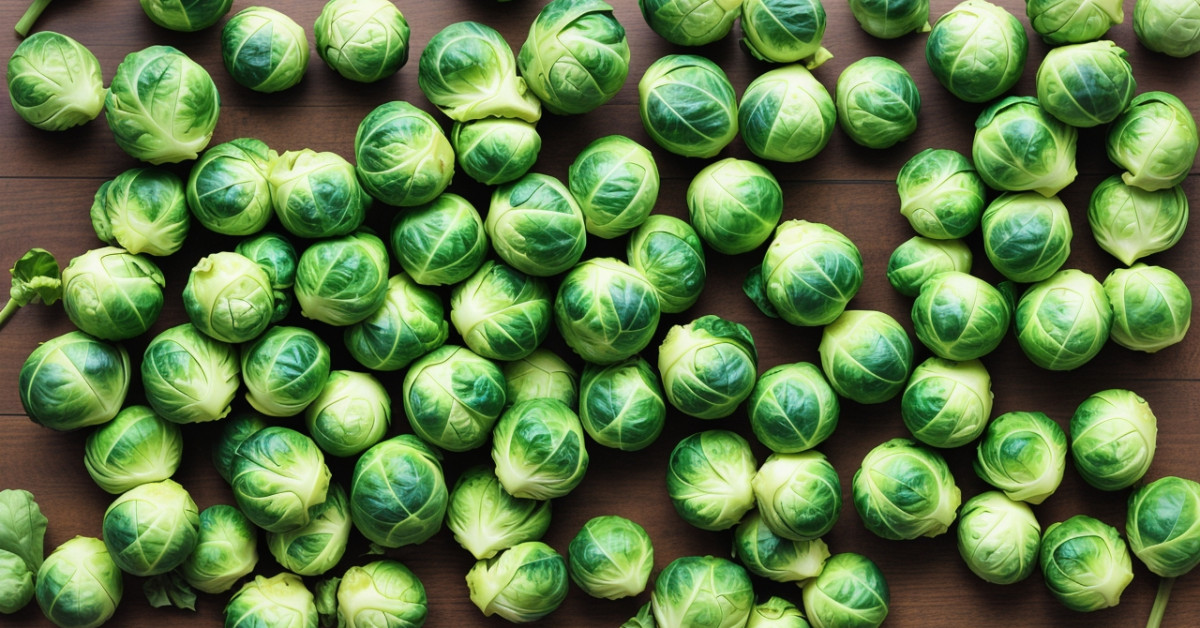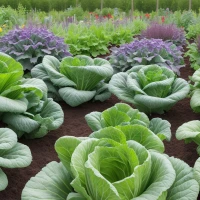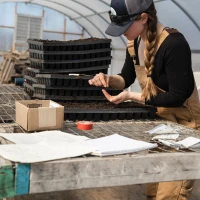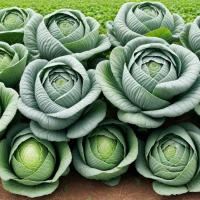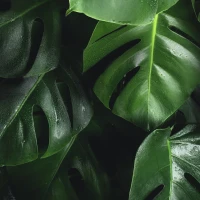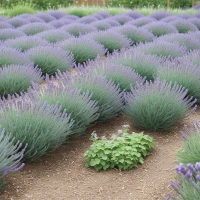Discover the secrets to a bountiful and healthy harvest with the ultimate guide to companion planting for brussels sprouts. These nutrient-dense vegetables are not only a culinary delight when roasted or sautéed, but they’re also a fantastic addition to your garden ecosystem. When you understand the synergistic relationships between certain plants, you’ll be able to unlock the full potential of your brussels sprouts. Let’s dive deep into the world of companion planting and reveal how to make your brussels sprouts flourish alongside their best friends.
The Fundamentals of Companion Planting
Companion planting is an age-old practice that leverages the beneficial interactions between different plant species to enhance growth, deter pests, and improve flavor. It involves thoughtfully arranging plants in your garden so that they can support each other, leading to a thriving and more resilient crop.
Why Companion Plant for Brussels Sprouts?
Brussels sprouts, with their compact stalks and rows of leafy green buds, can immensely benefit from having the right neighbors. The right companions can:
- Improve plant health: Some plants emit natural substances through their roots or leaves that can improve soil quality and deter pests, fostering a better environment for brussels sprouts.
- Boost flavor: Certain aromatic herbs are believed to enhance the flavor of brussels sprouts when planted in proximity.
- Increase pollination: Flowers that attract pollinators can help improve the yield of brussels sprouts by ensuring that more flowers are pollinated.
- Enhance soil structure: Deep-rooting companions can break up dense soil, allowing brussels sprouts’ roots to spread more easily and access nutrients.
- Provide shade and support: Taller plants can offer a break from the intense sun and lend support to brussels sprouts stalks.
By implementing companion planting strategies, you’ll not only promote healthier brussels sprouts but also cultivate a diverse, productive, and beautiful garden.
Best Companion Plants for Brussels Sprouts
When planning your garden, consider integrating these companion planting with cabbage plants to maximize the benefits for your brussels sprouts.
Alliums: Nature’s Pest Deterrent
Alliums, such as onions, garlic, and leeks, are superb companions for brussels sprouts. Their strong scent is said to repel common pests like aphids, which can chickens eat brussel sprouts cause significant damage to brussels sprouts.
- Onions: Interplanting onions with brussels sprouts can help deter the white cabbage butterfly.
- Garlic: An all-around great companion, garlic emits a strong odor that can mask the scent of brussels sprouts from pests.
- Leeks: These onion relatives have a similar pest-repelling effect and can also improve the overall taste of brussels sprouts.
Aromatic Herbs: The Flavor Enhancers
Certain aromatic herbs not only add complexity to your dishes but also to your garden dynamics. Herbs like:
- Thyme
- Rosemary
- Mint
These herbs can be valuable allies in combating insect pests with their intense fragrances while also possibly enhancing the flavor profile of your brussels sprouts.
Legumes: The Nitrogen Gifters
Legumes such as peas and beans are natural nitrogen-fixers, drawing nitrogen from the air and depositing it into the soil. This mutually beneficial relationship supports the growth of nitrogen-hungry brussels sprouts, leading to lush, leafy growth.
- Peas: Acting as a natural trellis, peas can offer support to brussels sprouts while enriching the soil.
- Beans: They can be planted in close proximity to provide slow-release nitrogen that brussels sprouts eagerly soak up.
Marigolds: The Colorful Defenders
Marigolds are more than just pretty; they’re a powerhouse in the garden. They contain natural compounds that can fend off harmful nematodes black and white chickens insects, acting as a protective barrier around your brussels sprouts.
- French Marigolds: Particularly effective against nematodes and can be planted along the border of your brussels sprouts patch.
Root Vegetables: The Subterranean Companions
Root vegetables like beets and carrots are excellent companions for brussels sprouts as they occupy different soil levels, minimizing competition for nutrients.
- Beets: Adding beets to your garden can also help by loosening the soil, making nutrient uptake easier for brussels sprouts.
- Carrots: Their roots help to break up dense soil, improving drainage and aeration.
Flowering Plants: The Pollinator Magnets
Integrating flowering plants into your vegetable garden is a smart way to attract pollinators. Bees and butterflies are essential for brussels sprouts pollination, which can be enhanced by nearby flowers.
- Borage: This herb produces beautiful blue flowers that attract beneficent insects while potentially repelling harmful caterpillars and worms.
- Nasturtiums: With their vivid blooms, nasturtiums can lure aphids away from your brussels sprouts, acting as a trap crop.
Plants to Avoid Near Brussels Sprouts
Not every plant plays nice with brussels sprouts. To prevent negative interactions, it’s important to know which plants to keep at a distance. These include:
Nightshades
Nightshade plants, including tomatoes, peppers, and eggplants, can host blight and other diseases that affect brussels sprouts. They also compete for similar nutrients, which can lead to stunted growth.
Strawberries
Strawberries may harbor verticillium wilt, a disease that can be devastating to brussels sprouts. To protect your crops, keep these two far apart in your garden layout.
Mustard Greens
Mustard greens can attract pests that also feed on brussels sprouts. It’s best to plant them in separate areas to avoid creating a pest hotspot.
Advanced Companion Planting Tips
For those willing to dive deeper into the art of companion planting, here are some advanced tips to get the most out of your brussels sprouts companions.
Intercropping and Crop Rotation
Strategically planning the layout of your garden with intercropping can maximize space and crop health. Rotate your brussels sprouts each year to avoid soil-borne diseases and give the land time to recover.
Polyculture over Monoculture
A polyculture garden that mimics natural ecosystems can lead to greater resilience against pests and diseases. Avoid large swathes of a single vegetable – diversity is key.
Soil Amendment and Mulching
Incorporate organic matter and mulch into your garden to support the microorganisms that benefit plant growth. This creates a healthy foundation for companion planting to thrive.
Beneficial Insects and Natural Predators
Encourage beneficial insects and natural predators like ladybugs and lacewings by providing a diversified habitat. They’ll help keep pest populations in check naturally.
Maximizing Your Brussels Sprouts Harvest
With the right companions, your brussels sprouts stand a much better chance of growing vigorously and producing a bountiful harvest. Remember to nurture your garden ecosystem, and it will reward you with delicious, homegrown brussels sprouts surrounded by a vibrant tapestry of beneficial plants.
Regular Maintenance and Observation
Regularly check your garden for pests and diseases, and take action early if you spot trouble. Healthy companion plants will aid in this effort by creating a more balanced garden environment.
Harvesting Tips for Best Flavor
Brussels sprouts taste best after a frost, so plan your harvest accordingly. Pick the sprouts from the bottom up as they mature for the best texture and flavor.
Enjoying Your Brussels Sprouts Beyond the Garden
Whether you’re roasting, grilling, or steaming your brussels sprouts, the satisfaction of growing them alongside their plant companions can make the experience all the more enjoyable.
Conclusion: A Symphony of Companions for Brussels Sprouts
Crafting a garden that sings with the harmony of companion planting can turn your brussels sprouts patch into a stronghold of productivity and taste. By understanding the relationships between plants, you can cultivate a more bountiful, healthy, and enjoyable garden. Let your brussels sprouts thrive with the help and protection of their best friends, and savor the rewards that come from a well-tended vegetable garden.
